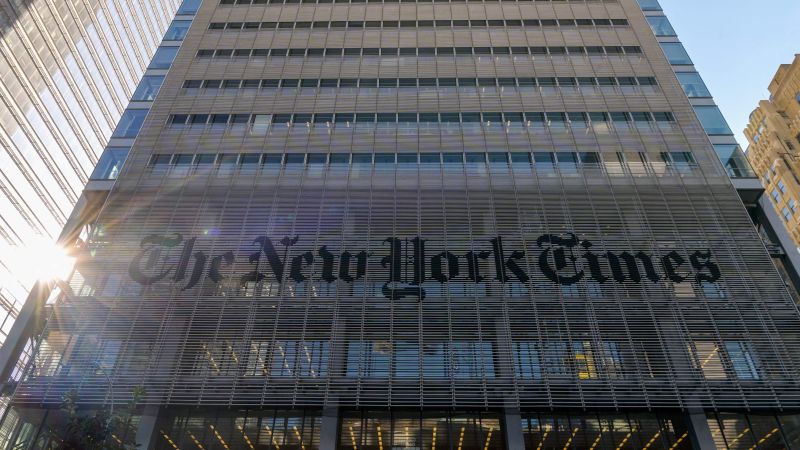New York
CNN Business
—
A 24-hour strike at The New York Times, a historic demonstration in which more than 1,100 employees are expected to participate, began Thursday at midnight, after management and the union representing staffers failed to reach an agreement for a new contract after more than a year and a half of negotiating.
“It’s disappointing that they’re taking such drastic action, given the clear commitment we’ve shown to negotiate our way to a contract that provides Times journalists with substantial pay increases, market-leading benefits, and flexible working conditions,” Meredith Kopit Levien, president and chief executive of The Times, said in an email to the company Wednesday night.
The NewsGuild of New York, which represents journalists and other staffers at The Times, said in a statement that the walkout was “due to the company’s failure to bargain in good faith, reach a fair contract agreement with the workers, and meet their demands.”
The act of protest, which has not been staged by employees at the newspaper of record in decades, will leave many of its major desks depleted of their staffs, creating a challenge for the news organization that millions of readers rely on.
An executive at The Times, who requested anonymity to speak candidly, acknowledged to CNN on Wednesday that the work stoppage would certainly create difficulties. But, the executive said, management has readied for the moment and could rely on the newspaper’s other resources, such as its international staff which largely are not part of the union, to fill the voids.
Joe Kahn, executive editor of The Times, said in a note to staff, “We will produce a robust report on Thursday. But it will be harder than usual.”
Kopit Levien added in her email to the company that The Times has “plans in place to ensure that we meet our obligation to our readers and the general public by reporting the news as fully as possible through any disruption caused by a strike.”
But some staffers at The Times went as far on Wednesday as to urge readers not to consume the outlet’s content during the walkout.
“We’re asking readers to not engage in any [New York Times] platforms tomorrow and stand with us on the digital picket line!,” Amanda Hess, a critic-at-large for the newspaper, wrote on Twitter. “Read local news. Listen to public radio. Make something from a cookbook. Break your Wordle streak.”
The strike comes as the Gray Lady and the NewsGuild of New York remain at odds over a number of issues, particularly wages, amid a backdrop of layoffs and cuts across the media industry.
In recent weeks, CNN laid off hundreds of staffers, newspaper chain Gannett cut 200 employees, NPR said it will need to find $10 million in savings, and other news organizations have explored the need to trim budgets and freeze hiring.
The Times has maintained that it offered the guild “significant increases,” but the union countered that the newspaper’s management has “frequently misrepresented its own proposals.”
The Union Times, a newsletter published by the NewsGuild, described The Times’ wage concessions on Wednesday as “paltry” and said management has “barely budged” on the issue.
The two parties have been bargaining since the last contract expired in March 2021. Last Friday, the NewsGuild informed The Times about its plans to stage a walkout, a move aimed at applying pressure to management to offer additional concessions in negotiations.
The union has asked The Times to meet in the middle on wage increases, but the newspaper believes the union started from an extreme position, making doing so a non-starter.
Both sides have worked throughout the week to avert the 24-hour strike. But it was to no avail.
Management at The Times had grown frustrated with how the NewsGuild has sought to conduct negotiations and partly blamed the lack of progress on it.
“They refuse to meet in person,” the executive told CNN. “It’s a really important point. I can’t emphasize it enough. We have negotiations on Zoom. There are eight or so people from management, as many as 18 people on the bargaining committee from the NewsGuild, and as many as 200 union members watching as ‘observers.’”
“Negotiations are essentially public,” the executive continued. “And that changes the whole dynamic of negotiations. It becomes very performative and very theatrical. It’s really hard to get things done. It’s like a show. And we need productive negotiations to get to a deal.”
Susan DeCarava, president of the NewsGuild of New York, said in response, “Union democracy is crucial to union power. That is why we don’t do closed-door negotiations, which management continues to demand.”
“All members who will be affected by the decision made at the bargaining table should be privy to those discussions,” the representative added. “When Times management comes to the bargaining table with their insulting and disrespectful offers, they have to explain it to a room full of their own employees—and they hate it. The result of management’s public actions is the powerful strike that is happening tomorrow.”








More News
Greene Moves to Oust Johnson, Teeing Up Another Historic Vote
An Inside Look at the Student Takeover of Columbia’s Hamilton Hall
Tornadoes Are Coming in Bunches. Scientists Are Trying to Figure Out Why.